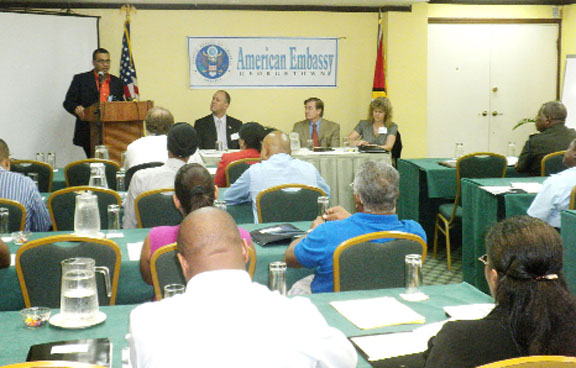Guyanese experts yesterday began tapping into knowledge on how to cushion the country from the ill-effects of oil exploration and exploitation with Minister of Natural Resources, Robert Persaud emphasizing that Guyana will not sacrifice environmental safety for wealth.

“We will not sacrifice the environment on the altar of prosperity but rather to see that mutual co existence…we can have that level of harmony that balance that is so necessary. Drawing from the experiences and the roads travelled by others we believe that we can do a better job” said the Minister.
The occasion was a workshop on `Managing the Early Phases of Offshore Oil and Gas Exploration:
Environmental Risk Mitigation’ being conducted by several American experts from January 22- 24 at the Cara Lodge on Quamina Street.
The workshop, under the auspices of the US embassy here, is being conducted by experts of the US Department of the Interior, Bureau of Ocean Energy Management and the Bureau of Safety and Environmental Enforcement.
Reflecting on oil exploration, the Natural Resources Minister said that the workshop could not have come at a better time and he used the stopping of drilling last year by Repsol of a high-pressure well as an example of Guyana’s commitment to the environment over wealth. “We talk about environmental risk mitigation… we can reflect on last year when we had drilling talking place, we had the Eagle (well) and we had the Jaguar (well) and in fact Jaguar had to be aborted because of risk factors …we decided that before the target was hit the decision was taken in the interest …that we abort it”, he said.
He also alluded to US President Barack Obama’s second inaugural speech where he emphasized the need to pay attention to global climate change. He stated that Guyana would look forward to greater support and cooperation from the United States towards climate change initiatives.
Persaud told of the high demand and growing interest in Guyana’s natural resources exploration, offshore, near shore and in the Takatu basin, by investors so much that his ministry is flooded with applications for prospecting licenses. He said that the type of training was necessary because of the newfound interests.
US Ambassador to Guyana, D Brent Hardt, said that the workshop comes at a time when Guyana is poised to become an energy producing nation. With a number of companies exploring for oil offshore Guyana, Hardt highlighted the need to focus on environmental protection and sustainability.
“As we look to the coast and the prospect of offshore oil, effective and environmentally sensitive management of oil production will prove vital in a nation in which ninety percent of the population lives along the coastline,” Hardt said in his address to attendees.
“That is why it is critical for Guyana at this time to not only utilize its abundance of natural resources wisely, but also to take steps to ensure it cherishes them, protecting the vast water supplies for which Guyana takes its name and preserving the unique rainforests that provide incredible woods such as purpleheart, greenheart, and so many others. There are historic economic opportunities to be pursued, but also important national decisions — choices that will outlive us all and determine the Guyana that your children and grandchildren live in”, he said.
He explained similarities to when the United States first had its Gold Rush in 1849 which spurred large migration to that country by persons seeking wealth.
He said then the environment was not a priority and “mercury hotspots” in California today are evidence of what the lack of an environmental preservation plan can lead to.
“Today, Guyana stands at a key juncture in its history, as it surveys promising extraction opportunities, phenomenal timber resources, and mineral wealth including gold, diamonds, bauxite, and manganese, while striving to preserve resources for the future and to develop a programme for sustainable growth”, he said .
“This resource wealth is now on the verge of being significantly enhanced by the possibility of oil discovery and the likelihood of Guyana transitioning to an energy producing nation … We all realize the great potential for national wealth that Guyana possesses, and yet we must all recognize the importance of Guyana’s incredible natural beauty and its wilderness”, Hardt added.
Topics include Environmental Analysis and Stakeholder Input Prior to Development, Applying Environmental Science to the Decision-Making Process, Environmental Studies Program, Ecology of the Deepwater, An Ecosystem-Based Approach to Adaptive Management, Environmental Analysis for Exploration and Production Permits, Risk Mitigation, Safety and Environmental Management Systems, and Oil Spill Preparedness and Response.




